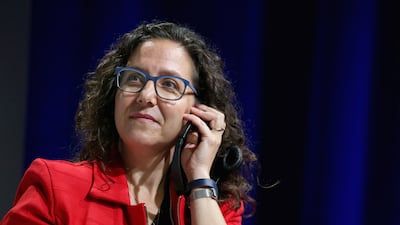President Joe Biden's nominee for the top Middle East role at the US Agency for International Development came under fire on Thursday for her previous criticism of the Abraham Accords.
Appearing at a Senate confirmation hearing, Tamara Cofman Wittes, who would oversee the distribution of aid across the Middle East, was grilled by several Republican senators over comments she made when the UAE and Israel signed the historic normalisation agreement.
Todd Young, a senator from Indiana, said Ms Wittes had written on her now-private Twitter account in 2020 that the deal was “oversold” and that Middle Eastern countries normalising relations with Israel was a “betrayal of Palestinian interests”.
Mr Young said Ms Wittes had also tweeted in support of an article saying the agreement was a “triumph for authoritarianism”.
The Abraham Accords - in pictures
The Abraham Accords, signed at the White House in 2020, normalised relations between the UAE and Israel. Bahrain, Morocco and Sudan soon followed suit.
Ms Wittes said she now supports the agreement.
“I support the profound transformation that they brought in the region. … They're a boon to the Israeli government, and to Israelis who have long felt isolated in their neighbourhood,” she told the Senate Foreign Relations Committee.
“That's the profound transformation we see not just at the government-to-government level, but at the people-to-people level, and it's very meaningful.”
When pressed, she said she had been wrong in at least part of her assessment of the Abraham Accords.
“I was sceptical that other countries would join the UAE in the Accords when the UAE first made its announcement in August of 2020,” Ms Wittes said.
“And I was wrong about that. We've seen Morocco, we've seen Sudan see buffering come in. That, I think, creates tremendous opportunity that we need to seize.”
In a sign her confirmation is likely to be split along partisan lines, Republican Ted Cruz also challenged Ms Wittes on her work at the Brookings Institution, where she was employed as a senior fellow in the Centre for Middle East Policy.
The influential think tank is at the centre of a controversy after its president, John Allen, resigned amid an FBI foreign lobbying investigation.
Court filings describe how the retired four-star general tried to help Qatar influence US policy in June 2017 when a diplomatic crisis erupted between the Gulf country and its neighbours.
A federal investigation involving Mr Allen has already ensnared Richard Olson, a former ambassador to the UAE and Pakistan who pleaded guilty to federal charges earlier this month.
“The president of Brookings resigned in a scandal because he's facing an investigation for being an undisclosed lobbyist for Qatar,” Mr Cruz said.
“To what extent did you participate in fundraising from Qatar?”
Ms Wittes said she had no knowledge of any of the “disturbing allegations” regarding Mr Allen but noted that some of her work was funded by foreign governments, among them Qatar. She stressed her work was independent and free of any influence.
Though Ms Wittes was nominated to the position about a year ago, Republicans — particularly Mr Cruz — have stalled her confirmation and that of dozens of other nominees.









































